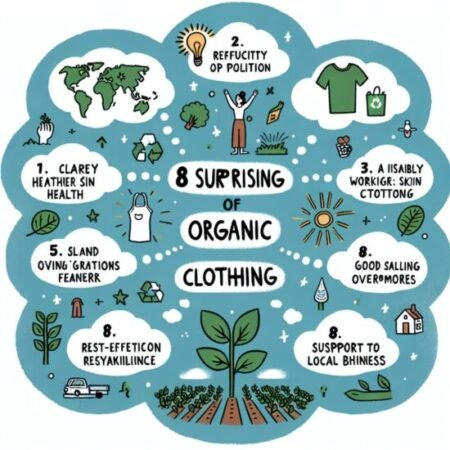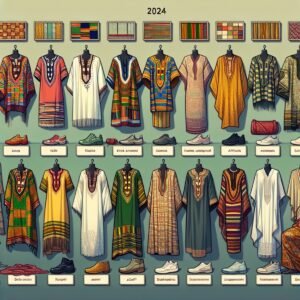
Introduction to Benefits of Organic Clothing
Organic clothing refers to garments made from materials that are grown and processed without the use of synthetic chemicals, such as pesticides, fertilizers, or genetically modified organisms (GMOs). This sets them apart from conventional clothing items, which often involve the heavy use of harmful chemicals in their production. The increasing consumer demand for sustainable and eco-friendly fashion choices has led to a surge in the popularity of organic clothing in recent years.
The Rise of Sustainable Fashion
With a growing awareness of the environmental impact of fast fashion, more individuals are seeking out alternatives that prioritize ethical and sustainable practices. As a result, organic cotton clothing and other eco-friendly options have gained traction as people actively seek out apparel that aligns with their values. This shift reflects a broader movement towards embracing products that minimize harm to the planet and promote responsible citizenship.
The Environmental and Health Advantages of Going Organic

1. Positive Impact of Organic Farming on the Environment
Organic cotton, the primary material used in organic clothing, is cultivated without the use of harmful chemicals or GMOs. This ensures a cleaner ecosystem compared to conventional cotton farming methods. Here are some ways in which organic farming contributes to reducing water pollution and mitigating climate change:
- Reduced water pollution: Conventional cotton farming relies heavily on toxic pesticides and fertilizers that can leach into nearby water sources. These chemicals not only contaminate the water but also harm aquatic life. On the other hand, organic farming prohibits the use of such chemicals, resulting in cleaner water systems.
- Mitigating climate change: Organic farming practices prioritize soil health and fertility through methods like crop rotation, composting, and natural pest control. These practices increase carbon sequestration in the soil, reducing greenhouse gas emissions and mitigating climate change.
- Conservation of biodiversity: Organic farms promote biodiversity by creating habitats for beneficial insects, birds, and other wildlife. This helps maintain a natural balance in ecosystems and supports pollinators, which are crucial for food production.
2. Healthier Option for Your Skin and Well-being
Wearing organic clothing can have significant benefits for your skin health and overall well-being. Here’s why:
- Chemical-free garments: Organic clothing is free from synthetic dyes, finishes, and treatments that are commonly found in conventional clothing. These synthetic chemicals can cause skin irritations, allergies, and other sensitivities. By choosing organic garments made from natural fibers, you reduce the risk of skin concerns caused by chemical exposure.
- Improved air quality: The use of toxic chemicals in conventional textile manufacturing releases volatile organic compounds (VOCs) into the environment. VOCs contribute to air pollution both outdoors and indoors. Opting for organic clothing reduces your exposure to these harmful substances, promoting better indoor air quality and protecting your respiratory health.
- Emotional and mental well-being: Wearing organic clothing made from natural fibers can have a positive impact on your emotional and mental well-being. The softness, breathability, and comfort of organic fabrics can create a sense of coziness and relaxation, helping to reduce stress levels and promote a sense of overall well-being.
By choosing organic clothing, you not only prioritize the health of your skin but also support a more sustainable and eco-friendly fashion industry. The environmental benefits of organic farming practices contribute to a cleaner planet for future generations.
2. Healthier Option for Your Skin and Well-being
Wearing organic clothing is not only good for the environment but also has direct benefits for your health and well-being. Here’s why:
Chemical-Free Garments
Organic clothing, particularly those made from materials like organic cotton, are free from synthetic dyes and treatments that often contain harmful chemicals. This means:
- You reduce the risk of skin irritations and allergies commonly associated with conventional clothing.
- The absence of chemical retentions in organic clothing can help prevent various skin concerns, providing a more comfortable and safer experience for your skin.
Potential Health Benefits
While more research is needed in this area, some individuals have reported experiencing additional health benefits from wearing organic clothing, such as:
- Enhanced overall well-being
- Decreased exposure to toxins commonly found in non-organic fabrics
By wearing organic clothing, you not only support sustainable farming methods but also prioritize your own health and well-being.
Ethical Considerations and Responsible Fashion Practices

1. Upholding Higher Standards in Manufacturing
Discuss how organic clothing brands often prioritize the well-being of both their workers and consumers by adhering to stringent safety standards throughout the production process.
Organic clothing brands place a strong emphasis on upholding higher standards in manufacturing, ensuring the well-being of both their workers and consumers. This commitment to ethical fashion practices sets them apart from conventional clothing manufacturers and contributes to a more sustainable and responsible industry.
Safety Standards and Worker Well-being
One of the key aspects of ethical manufacturing in the organic clothing industry is the adherence to stringent safety standards. This includes providing a safe working environment for employees, ensuring fair wages, and prohibiting exploitative labor practices. By prioritizing the welfare of their workers, organic clothing brands contribute to the promotion of responsible citizenship within the fashion sector.
Environmental Impact
In addition to focusing on worker well-being, organic clothing manufacturers also strive to minimize their environmental impact. They implement eco-friendly practices throughout the production process, such as utilizing renewable energy sources, reducing water consumption, and minimizing waste generation. These initiatives align with the broader goal of sustainable fashion and demonstrate a commitment to responsible resource management.
Transparency and Accountability
Furthermore, ethical fashion practices encompass transparency and accountability within the supply chain. Organic clothing brands often maintain a transparent approach to sourcing materials, production methods, and labor conditions. This transparency allows consumers to make informed purchasing decisions based on their values, supporting brands that uphold ethical standards and contribute to a greener fashion industry.
Cost Considerations
While it’s commonly perceived that ethical manufacturing drives up production costs, leading to higher retail prices for organic clothing, it’s essential to consider the true cost of cheap fashion. Conventional clothing may carry hidden expenses in the form of environmental degradation, compromised worker well-being, and long-term health implications. By investing in ethically produced garments, consumers align themselves with responsible citizenship and support sustainable practices within the fashion supply chain.
In conclusion, upholding higher standards in manufacturing is integral to the ethical considerations and responsible fashion practices observed within the organic clothing industry. By prioritizing safety standards, environmental impact, transparency, and accountability, organic clothing brands play a pivotal role in promoting a more sustainable and conscientious approach to fashion.
2. Balancing Cost Considerations with Long-Term Value
Organic clothing has ethical and social justice aspects that we need to understand. This includes the importance of fair labor practices and transparency in the fashion industry’s supply chain. Many people believe that organic clothing is more expensive compared to regular clothing. However, there are factors to consider when looking at this perception:
- Economies of Scale: Organic clothing may have a higher initial cost, but as more people demand sustainable fashion, production costs are likely to decrease due to economies of scale.
- True Cost of Cheap Fashion: Regular fashion often has hidden costs that harm both the environment and people. This includes things like unfair treatment of workers and damage caused by chemical-heavy farming methods.
- Ethical Fashion and Responsible Citizenship: When you choose organic clothing, you’re not just picking a sustainable option for yourself – you’re also supporting fair manufacturing practices and being a responsible citizen. This means promoting fair wages, safe working conditions, and transparent supply chains in the fashion industry.
When we talk about the cost of organic clothing, it’s crucial to look beyond the price tag and think about its long-term value. Here are some important points to remember:
- Organic clothing might be more expensive at first, but its durability can make it last longer than regular clothing.
- By choosing organic materials, we reduce our reliance on harmful chemicals used in conventional farming.
- Supporting brands that prioritize sustainability encourages other companies to follow suit.
It’s important to recognize that while organic clothing may have a higher upfront cost, its long-term value in terms of durability, environmental impact, and ethical considerations makes it a worthwhile investment for conscious consumers.
Examining Organic Clothing in Comparison to Conventional Alternatives

When it comes to clothing materials, organic cotton stands out as a sustainable choice compared to conventional alternatives. Let’s take a closer look at how organic clothing materials, particularly organic cotton, compare to other commonly used fabrics in terms of their impact on the environment and personal health:
1. Organic Cotton vs. Conventional Cotton
- Organic cotton is grown without the use of synthetic fertilizers, pesticides, or genetically modified organisms (GMOs). In contrast, conventional cotton farming relies heavily on these chemicals, which can pollute water sources and harm ecosystems.
- The cultivation of organic cotton promotes biodiversity and healthy soil, as it avoids the use of harmful chemicals that can degrade the environment. This makes organic cotton a more sustainable option for eco-conscious consumers.
2. Organic Cotton vs. Synthetic Fabrics
- Synthetic fabrics like polyester and nylon are derived from non-renewable resources such as petroleum. Their production involves energy-intensive processes that contribute to greenhouse gas emissions.
- On the other hand, organic cotton is a natural fiber that is biodegradable and renewable. It has a lower carbon footprint compared to synthetic fabrics since its production requires less energy and emits fewer greenhouse gases.
3. Organic Clothing and Personal Health
- Organic clothing is free from synthetic dyes, finishes, and treatments that can contain harmful chemicals. This reduces the risk of skin irritations and allergies often associated with conventional garments.
- Additionally, wearing organic clothing can contribute to better overall well-being by minimizing exposure to toxins found in conventional clothing. By choosing organic materials against potentially harmful synthetic alternatives, you are making a conscious decision for your health.
By examining the impact of organic clothing materials like organic cotton compared to conventional alternatives such as conventional cotton and synthetic fabrics, it becomes evident that organic clothing offers both environmental and personal health benefits. Its sustainable production methods and chemical-free composition make it a responsible choice for conscious consumers who value their well-being and the health of the planet.
Supporting Sustainable Agriculture through Choosing Organic Cotton
Organic cotton farming methods promote soil health, reduce water consumption, and eliminate the use of harmful chemicals, thereby supporting sustainable agriculture. By choosing organic cotton products, consumers can actively participate in fostering environmentally-friendly practices and promoting ethical standards within the fashion industry.
This educational intent about organic cotton clothing benefits aligns with the broader goal of creating awareness about the positive impact of sustainable agricultural practices on a global scale. Furthermore, the informational intent about organic cotton farming methods and environmental impact empowers consumers to make informed choices that prioritize eco-conscious values, contributing to a healthier planet for future generations.
The Bottom Line: Embracing the Benefits of Wearing Organic Clothing
Organic cotton clothing offers a wide range of benefits, including its positive impact on the environment and its potential to protect our skin and overall health. By choosing organic garments, we can:
- Reduce environmental harm: Organic farming methods eliminate the use of harmful chemicals, pesticides, and genetically modified organisms (GMOs), leading to healthier soil, water, and ecosystems.
- Support fair trade practices: Many brands that produce organic clothing also prioritize fair labor conditions, ensuring that workers receive fair wages and are treated with dignity.
- Promote better health: Conventional cotton production involves the use of toxic chemicals that can irritate the skin and cause allergies or other health issues. Organic clothing, on the other hand, is made from natural fibers that are free from these harmful substances.
- Foster innovation in sustainable fashion: By supporting brands that prioritize organic materials and sustainable production methods, we can encourage more innovation and positive change in the fashion industry.
Making a conscious choice towards a more sustainable wardrobe by opting for organic garments allows us to align our values with our purchasing decisions. Together, we can support brands that uphold ethical standards and contribute to a greener fashion industry.
sustainable fashion
ethical clothing
environmentally friendly clothing
organic cotton benefits
natural fibers advantages
eco-friendly apparel
green fashion benefits
organic clothing advantages
non-toxic clothing benefits
healthy fabric advantages
chemical-free clothing benefits
natural dyes benefits
renewable materials advantages
fair trade fashion benefits
biodegradable clothing advantages
FAQs (Frequently Asked Questions)
What is organic clothing and how does it differ from conventional clothing items?
Organic clothing is made from materials that are grown without the use of harmful chemicals or genetically modified organisms (GMOs). This differs from conventional clothing, which often involves the use of pesticides, synthetic fertilizers, and other potentially toxic substances in the production process.
What are the environmental advantages of choosing organic clothing?
Choosing organic clothing, particularly those made from organic cotton, can have a positive impact on the environment. Organic farming methods contribute to reducing water pollution and mitigating climate change, making it a more sustainable choice for conscious consumers.
How does organic clothing benefit skin health and overall well-being?
Organic clothing, especially those made from organic cotton, is beneficial for skin health as it is cultivated without the use of harmful chemicals. This can help prevent skin irritations and allergies that are commonly associated with synthetic dyes and treatments. Additionally, wearing chemical-free organic garments may have potential additional health benefits such as enhanced overall well-being and decreased exposure to toxins.
How do organic clothing brands uphold higher standards in manufacturing?
Organic clothing brands often prioritize the well-being of both their workers and consumers by adhering to stringent safety standards throughout the production process. This includes ensuring fair labor practices and supply chain transparency in the fashion industry.
Is organic clothing more expensive than conventional alternatives?
There is a perception that organic clothing is more expensive than its conventional counterparts. However, it’s important to consider factors such as economies of scale and the true cost of cheap fashion when comparing cost considerations with long-term value.
How does organic cotton compare to other commonly used fabrics in terms of their impact on the environment and personal health?
A nuanced perspective can be provided by comparing organic cotton with other commonly used fabrics in terms of their impact on the environment and personal health. This comparison can help individuals make informed choices about the materials used in their clothing.
How can choosing organic cotton support sustainable agriculture?
Choosing organic cotton supports sustainable agriculture by contributing to a more environmentally friendly and ethical fashion industry. It encourages consumers to learn more about organic cotton farming practices and how they can make a positive impact through their purchasing decisions.
What are the benefits of wearing organic clothing?
Wearing organic cotton clothing offers a diverse range of benefits, including its positive environmental footprint and its potential for safeguarding skin health and overall well-being. By opting for organic garments, individuals can make a conscious choice towards a more sustainable wardrobe while supporting brands that uphold ethical standards.







2 thoughts on “8 Surprising Benefits of Organic Clothing You Need to Know”